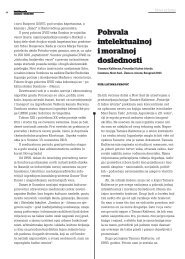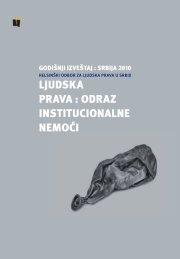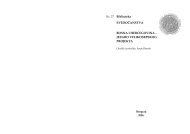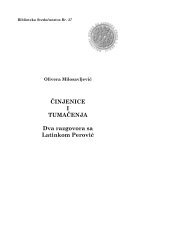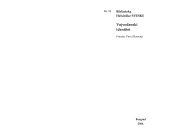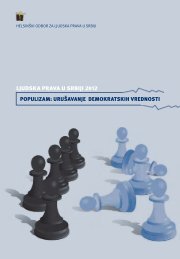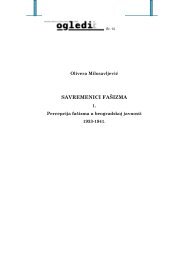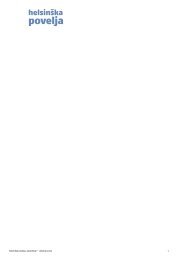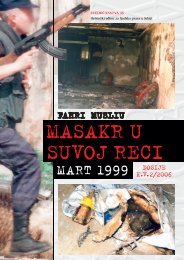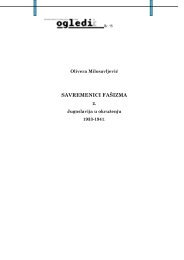Human Rights: Hostage To the State's Regression - Helsinki ...
Human Rights: Hostage To the State's Regression - Helsinki ...
Human Rights: Hostage To the State's Regression - Helsinki ...
Create successful ePaper yourself
Turn your PDF publications into a flip-book with our unique Google optimized e-Paper software.
<strong>Helsinki</strong> Committee for <strong>Human</strong> <strong>Rights</strong> in Serbia<br />
into a mosaic of lies, deceits, and self -illusions, still cherished in regard to <strong>the</strong><br />
90's. The action takes place in <strong>the</strong> occupied Vukovar. It is a story of a peasant<br />
from village Veliki Krčmar journeying to <strong>the</strong> Vukovar battlefield to look for his<br />
son, who, as it turned out in <strong>the</strong> later sequences had perished in Jankovci. The<br />
director, in <strong>the</strong> true vein of Milosevic propaganda, tries to ideologically<br />
connect <strong>the</strong> fates of Serb soldiers who perished in that area in <strong>the</strong> years 1914,<br />
1944, and 1991, against <strong>the</strong> narrative backdrop portraying <strong>the</strong> hero-style burial<br />
of officers who had taken part in <strong>the</strong> Vukovar siege.<br />
Though any of those war-<strong>the</strong>med films had <strong>the</strong> opportunity to touch<br />
on <strong>the</strong> issue responsibility for all factors contributing to war crimes in Croatia,<br />
Bosnia and Kosovo, <strong>the</strong>ir authors, including Siniša Kovačević, instead opted<br />
for doctoring of events. The foregoing would be a private problem of those<br />
authors, if <strong>the</strong>ir films were not so attractive for <strong>the</strong> wide audiences and<br />
influential too. In view of such character of feature films, <strong>the</strong> total 2006 film<br />
production was saved from a total shame by documentaries, notably “Vukovar<br />
– <strong>the</strong> Last Cut” by authors Janko Baljak and Drago Hedl, which revealed things<br />
which that Slavonija town experienced as <strong>the</strong> true apocalypse, and<br />
“Deportation – an Award for Loyalty” directed by Vlada Mareš, <strong>the</strong> film which<br />
speaks about banishment of over one thousand Bosniaks from Kozluk, and<br />
<strong>the</strong>ir terrible exile, across Serbia, to Hungary, in mid-1992.<br />
Though an educational role cannot be expected from <strong>the</strong> moviemaking<br />
art, <strong>the</strong>re is no doubt that war films also have an extra-artistic,<br />
cognitive dimension, affecting notably viewers on <strong>the</strong> o<strong>the</strong>r bank of river<br />
Drina, since locals in Bosnia and Croatia have already directly felt <strong>the</strong> terror of<br />
<strong>the</strong> 90's. In view of <strong>the</strong> foregoing, films from Croatia and Bosnia have more<br />
impact on <strong>the</strong> topics of responsibility and reconciliation than any related panel<br />
discussion, which are, by <strong>the</strong> way, avoided as a plague by <strong>the</strong> majority Serbia<br />
or, as <strong>the</strong> most boring lesson. The latter stance is most probably related to <strong>the</strong><br />
general aversion to facing up to <strong>the</strong> recent past, that is, atrocities, war crimes<br />
and consequences cum results <strong>the</strong>reof. Hence such film production represents<br />
a kind of extra-curricular education for those refusing to believe that such<br />
terrible things had happened in Bosnia and Croatia. It is obviously unpleasant<br />
to watch how members of a nation are treated as children, but even that is<br />
more palatable <strong>the</strong>n <strong>the</strong> finger-poking into closed eyes, <strong>the</strong> phenomenon<br />
commonplace at panel discussions with participants and audience, allegedly<br />
mature enough to realize and admit <strong>the</strong>ir mistakes, in order to move forward<br />
at all.<br />
Situation is equally bad in o<strong>the</strong>r creative spheres. It is a fact that <strong>the</strong><br />
Serb literature during <strong>the</strong> 90's was indelibly marked by <strong>the</strong> war experience,<br />
and that <strong>the</strong> character and brutality of <strong>the</strong> conflict in former Yugoslavia,<br />
largely determined <strong>the</strong> sensibility of such-<strong>the</strong>med literary work, oft investing it<br />
with <strong>the</strong> surplus of patriotism. However, as of late writers have been turning<br />
<strong>the</strong>ir attention to mundane topics. The same holds true of <strong>the</strong> last year's<br />
<strong>Human</strong> <strong>Rights</strong>: <strong>Hostage</strong> <strong>To</strong> <strong>the</strong> <strong>State's</strong> <strong>Regression</strong><br />
literary output. A look at <strong>the</strong> novels which were shortlisted for <strong>the</strong> prestigious<br />
NIN Award - “The Bridge” by Zoran Zivkovic, “Four Walls and <strong>the</strong> City” by<br />
Zvonko Karanović, “Emilija Leta” by Mirjana Mitrović, “Komo” by Srñan<br />
Valjarević and “Rise and Fall of Parkinson's Disease” by Svetislav Basara,<br />
shows that only Karanović's heroes walk through <strong>the</strong> maze of recent<br />
developments. Namely his lead protagonist, Vladan Mitić – Tatula, onetime<br />
student of <strong>the</strong> prestigious Amsterdam Art Academy, returns to Serbia in 1991<br />
only to become a victim of <strong>the</strong> Balkans war, as <strong>the</strong> film's end sees him as a war<br />
invalid. War and post-war scenes lurk between passages of <strong>the</strong> novel<br />
“Through Desert and Dust”, by Srñan Tešin, in which <strong>the</strong> 90's blood-bath cum<br />
slaughterhouse becomes a kind of counterpoint to <strong>the</strong> sheltered youth of <strong>the</strong><br />
main protagonist. 90's are also dealt with in an artistically impressive way in<br />
<strong>the</strong> novel “Collection” by Mileta Prodanović, dominated by “<strong>the</strong> 10-day war”<br />
memories and reminiscences of a heroine, daughter of a Slovenian woman and<br />
<strong>the</strong> Serb officer. It is noteworthy that <strong>the</strong> personality of a journalist, one of <strong>the</strong><br />
novel's heroes, is based on a real-life persona, <strong>the</strong> one of a tragically perished<br />
editor-in-chief of “Telegraf”, Slavko Ćuruvija. Thus Prodanovic turned <strong>the</strong><br />
shadow of death into a symbol of an era, which is still awaits a more serious<br />
literary treatment and re-appraisal.<br />
While many important writers are waiting for <strong>the</strong> dust to settle in<br />
order to tackle in a cold-headed way <strong>the</strong>mes related to <strong>the</strong> war and recent past,<br />
writing was taken up, even professionally, in 2006 by some notorious public<br />
figures, who until recently in <strong>the</strong>ir hands held only arms. After “The Iron<br />
Trench” and “The Legionary” <strong>the</strong> man indicted for assassination of Prime<br />
Minister Zoran ðinñić, Milorad Ulemek Legija, who added to everything else,<br />
was immortalized in a film showing him and his fellow-fighters agreeing to<br />
kill Bosniaks imprisoned near Velika Kladuša, presented in 2006 to his fans<br />
even two, new novels, – “The Boys from Brazil” and “Judas: A Novel of<br />
Friendship”. The byline Ulemek is just a cover-up or a sham, it serves to attract<br />
<strong>the</strong> wide readership, while <strong>the</strong> name of <strong>the</strong> real author of this novels is in fact<br />
unknown. It was possible to pull such a publicity stunt only in Serbia, where<br />
<strong>the</strong> third-rate writers were <strong>the</strong> top informers of various secret services and <strong>the</strong><br />
Interior Ministry employees treated as stars in panel discussions staged by <strong>the</strong><br />
notorious Writers' Association in Francuska 7 Street, in Belgrade. Hot on <strong>the</strong><br />
heels of “Narodna Knjiga” success-that publishing house which in recent years<br />
established itself as <strong>the</strong> top publisher earned over 100,000 Euros from <strong>the</strong> sellout<br />
of “The Iron Trench” novel, depicting <strong>the</strong> Bosnian war experience of a<br />
volunteer from Belgrade-“Spina” publishing house, ran by Ulemek's wife,<br />
Aleksandra Ivanović, published 10,000 copies of “The Boys from Brazil”, a<br />
somewhat smaller circulation in regard to <strong>the</strong> one of “The Iron Trench”<br />
(70,000) and “The Legionary” (25,000). The aforementioned collection of short<br />
stories, purporting to show <strong>the</strong> writer's or Ulemek's literary versatility,<br />
describes war developments in Kosovo, Bosnia and Croatia, with a<br />
58<br />
59



